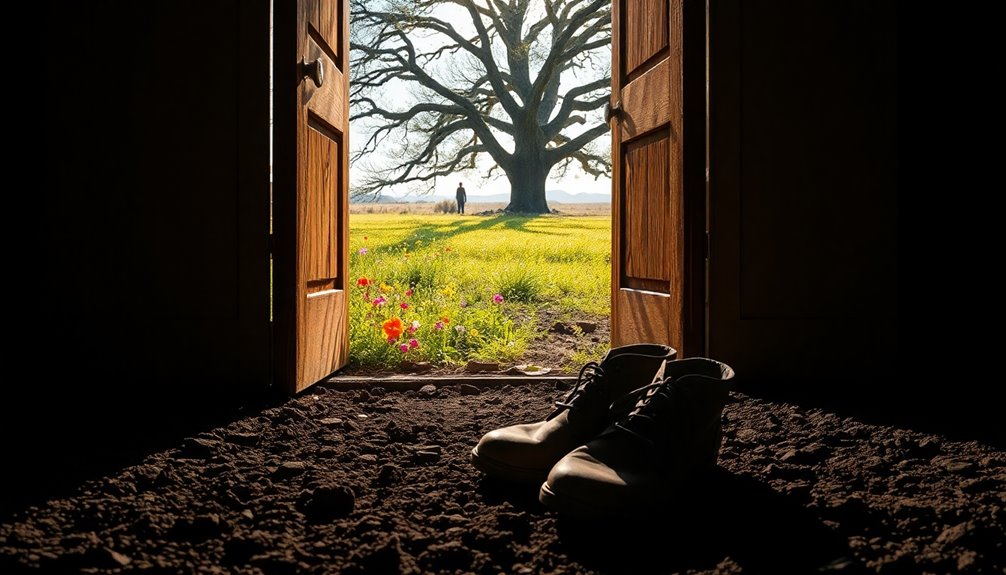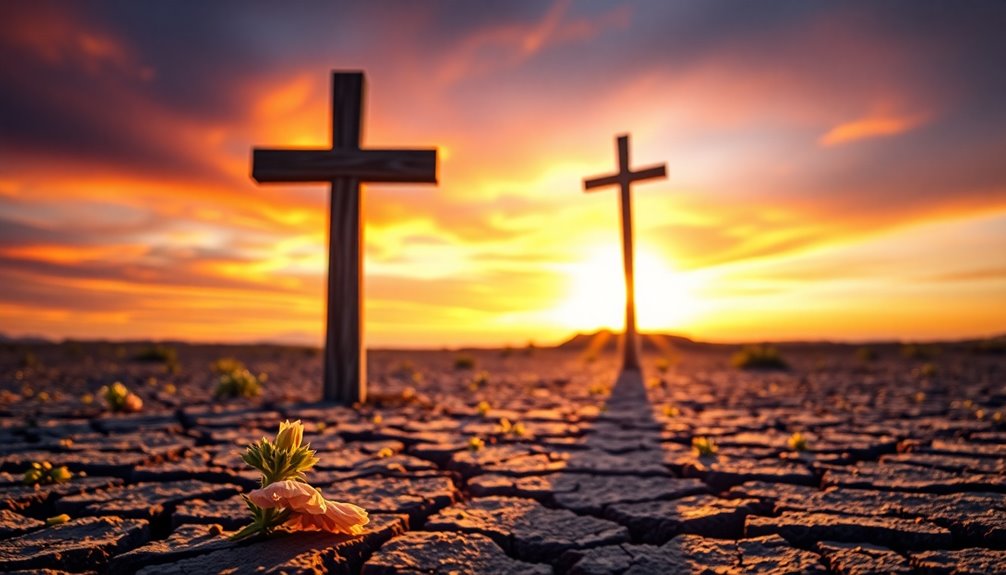A kinsman-redeemer is a male relative in ancient Israel tasked with helping family members in need, especially widows or those at risk of losing property. This role involves redeeming land to keep it within the family and marrying a deceased brother's widow to maintain family lineage. You see this vividly in the Book of Ruth, where Boaz steps in to protect Naomi and Ruth. The kinsman-redeemer symbolizes family loyalty and social justice, emphasizing community support. If you're curious about how this concept plays out in biblical narratives and its modern implications, you might find the following insights compelling.
Key Takeaways
- A kinsman-redeemer is a male relative responsible for aiding family members in need, particularly widows and preserving family property.
- Key biblical texts include Leviticus 25, the Book of Ruth, and Deuteronomy, outlining the kinsman-redeemer's duties.
- Duties involve redeeming property and marrying a deceased brother's widow to maintain family lineage and social justice.
- Boaz exemplifies the kinsman-redeemer role by redeeming Naomi's land and marrying Ruth, emphasizing community loyalty.
- Jesus Christ is viewed as the ultimate kinsman-redeemer, redeeming humanity from sin and modeling principles of loyalty and responsibility.
Introduction

Often overlooked, the role of a kinsman-redeemer is a vital aspect of ancient Israelite culture that highlights the importance of family and community support. A kinsman-redeemer is a male relative tasked with aiding family members in need, especially concerning property and lineage. In Leviticus 25:25-26, the responsibilities of this role are clearly defined, emphasizing the obligation to redeem property or marry a widow to ensure the family's survival.
The Book of Ruth provides a poignant illustration of these duties, particularly through Boaz, a prominent kinsman-redeemer. He not only marries Ruth but also redeems Naomi's family land, showcasing the practical application of this role in biblical narratives.
The kinsman-redeemer's responsibilities extend beyond financial assistance; they also include avenging the death of relatives and promoting social justice within the community.
This concept isn't just an ancient practice; it foreshadows the New Testament portrayal of Jesus as the ultimate kinsman-redeemer. By understanding the significance of this role, you can appreciate the depth of redemption woven throughout the biblical story, culminating in the ultimate act of love and sacrifice.
Biblical Basis for Redemption

To understand the biblical basis for redemption, you'll want to explore key scriptural references.
Primary texts like Leviticus and the Book of Ruth provide foundational insights into the role of the kinsman-redeemer.
Additionally, secondary references help deepen your understanding of how these principles apply throughout the Scriptures.
Primary Bible References
The concept of the kinsman-redeemer springs from key biblical passages that outline the responsibilities of family members in the act of redemption. In Leviticus 25, you see the foundation for this role, where a kinsman is called to redeem property and provide support to relatives in need.
The Book of Ruth vividly illustrates this through Boaz, who redeems Naomi's land and marries Ruth, ensuring the continuation of their family line (Ruth 4:1-10).
Deuteronomy 25:5-6 further clarifies the kinsman-redeemer's duty, stating that a brother must marry his deceased brother's widow to produce offspring for him, preserving the family lineage.
In Jeremiah 32:6-15, the prophet's act of purchasing his cousin's field signifies hope and restoration, emphasizing the kinsman-redeemer's ongoing importance in Israel's history.
While the Old Testament sets the stage, the New Testament reveals Christ as the ultimate kinsman-redeemer.
Galatians 3:13 highlights how He redeems believers from the curse of the law, fulfilling the redemptive purpose established in the Old Testament.
These references underscore the profound significance of redemption woven throughout scripture.
Secondary Bible References
A deeper understanding of the kinsman-redeemer concept can be found in various secondary Bible references that reinforce its significance. Leviticus 25:25 establishes that a relative has the duty to redeem a family member's property, highlighting the importance of familial bonds in times of hardship.
Deuteronomy 25:5-6 further clarifies this role through the levirate marriage law, ensuring that family lineage is preserved, a key aspect of the kinsman-redeemer's responsibility.
The story of Ruth and Boaz in Ruth 4 exemplifies this principle in action, as Boaz redeems Naomi's land and marries Ruth, demonstrating how the kinsman-redeemer sustains family heritage.
Jeremiah 32:6-15 also illustrates redemption when the prophet buys his cousin's land, symbolizing hope and restoration for Israel.
Transitioning to the New Testament, Galatians 3:13 states that Christ redeems us from the curse of the law, directly linking His work to the kinsman-redeemer concept.
Through the precious blood of Jesus, we find not just redemption but the fulfillment of God's promise to restore us, underscoring the depth of this biblical theme.
Ancient Israelite Family Structures

Patriarchal authority defined ancient Israelite family structures, where the male head of the household wielded significant power and responsibility.
In this system, family units often included extended relatives, emphasizing communal support and shared responsibilities. The inheritance laws dictated that property passed down through male heirs, ensuring that land remained within the family and highlighting the importance of family lineage.
Women primarily focused on domestic duties, but they could gain rights through practices like levirate marriage. This allowed a brother-in-law to marry a widow to preserve family lineage and offer her protection.
The role of the kinsman-redeemer was crucial in these structures, providing a safety net for vulnerable family members like widows and orphans. This practice reinforced the values of social justice and familial loyalty, ensuring that no one fell through the cracks.
Cultural Significance of Redemption

Rooted deeply in ancient Near Eastern customs, the concept of redemption carries profound cultural significance in Israelite society. As a kinsman-redeemer, a man took on the obligation to support his relatives, especially widows and orphans, ensuring their survival. The redemption price often included property and financial assistance, which created a safety net for vulnerable family members. This communal responsibility reinforced familial loyalty and social unity.
In the Book of Ruth, Boaz exemplifies the essence of kinsman-redeemer by redeeming Ruth and Naomi, symbolizing more than personal loyalty. His actions highlight broader themes of community support and social justice, illustrating the vital role of redemption in maintaining family heritage and lineage.
Levirate marriage laws further emphasize this cultural practice, mandating that a male relative marry his deceased brother's widow to preserve the family name.
Additionally, the Year of Jubilee celebrated redemption by canceling debts and returning land, underscoring the importance of economic equity. This practice not only restored property but also reinforced the collective responsibility of the community to care for its members.
Through these customs, redemption became a cornerstone of Israelite identity and societal structure.
Kinsman-Redeemer Role in Society

When you think about the kinsman-redeemer, it's easy to misunderstand their role and responsibilities in society.
Many people believe it was solely about financial support, but there's much more to it, including protecting family honor and ensuring lineage.
Let's unpack these misconceptions and clarify what being a kinsman-redeemer really entailed.
Debunk Common Misconceptions
Despite common beliefs, the kinsman-redeemer role in ancient Israel was far more complex than just a marriage arrangement. Many people misunderstand this position, thinking it's merely a legal obligation. In reality, it encompasses a range of responsibilities, including redeeming property and supporting vulnerable family members, as outlined in Leviticus 25:25-26. This role requires a close relative, ensuring that familial loyalty remains central to the practice.
Another common misconception is that the kinsman-redeemer's duties are optional. However, failing to fulfill these responsibilities could lead to societal shame and a breakdown of family lineage, as seen in the story of Boaz and Ruth. The kinsman-redeemer also serves as an avenger of wrongs, highlighting the deep connections and social justice embedded in ancient Israelite culture.
Additionally, the role underscores the importance of community and familial networks, which were crucial for survival and social stability, particularly in times of crisis.
Misunderstanding Kinsman-Redeemer Duties
Understanding the kinsman-redeemer's duties reveals a multifaceted role that goes beyond mere legal obligations. The kinsman-redeemer isn't just a financial savior; he's deeply woven into the social fabric of his family and community. His primary duty involves redeeming property sold due to poverty, ensuring family land stays within the lineage, as outlined in Leviticus 25:25-26.
Furthermore, he must marry a deceased brother's widow to preserve the family name, as mandated by the Levirate marriage laws in Deuteronomy 25:5-6.
Misunderstandings often arise regarding these responsibilities. Many think the kinsman-redeemer's role is solely financial, but it's about protecting and supporting vulnerable relatives, particularly widows and orphans. The cultural practices around this role highlight the importance of community support and familial loyalty, especially in societies facing high mortality rates.
Consider Ruth's story: a closer relative's refusal to redeem Naomi's land illustrates the complexities of kinsman-redeemer duties. It shows the potential consequences of prioritizing personal interests over family responsibilities.
Community Support Initiatives

In your community, individual acts of kindness can make a huge difference for those in need.
Local outreach programs often rely on your participation to provide support to vulnerable groups like widows and orphans.
Individual Acts of Kindness
Community support initiatives thrive on individual acts of kindness that embody the spirit of the kinsman-redeemer concept. When you lend a hand to a neighbor in need, you reflect the very essence of this idea.
Programs like food banks and clothing drives are perfect examples of how your kindness can directly impact those facing financial crises. By volunteering at local shelters or community centers, you not only help provide essential resources but also show your commitment to protecting and supporting those in distress.
Mentoring or tutoring underprivileged youth is another powerful way to act as a kinsman-redeemer. Through these relationships, you foster hope and resilience, ensuring that family lineage and community ties remain strong.
Additionally, participating in community fundraising events or donation drives reinforces the idea of social responsibility, showing that together, you can create a supportive environment during challenging times. By understanding the importance of cooperative co-parenting plans, community members can better support families navigating difficult transitions.
Every individual act of kindness contributes to the larger tapestry of community support initiatives, making a meaningful difference in the lives of others.
Local Outreach Programs
Local outreach programs play a vital role in embodying the spirit of the kinsman-redeemer by providing direct support to vulnerable populations, such as widows and orphans. These initiatives often focus on community support, ensuring that basic needs are met through food drives and financial assistance for families facing economic hardships. By doing so, they reflect the kinsman-redeemer principle of helping those in dire situations.
Additionally, volunteer initiatives like mentoring programs help build strong relationships among community members. This fosters a sense of family responsibility, echoing the role of a kinsman-redeemer. Outreach programs frequently collaborate with local businesses and government agencies, pooling resources to amplify their impact and enhance community welfare.
Moreover, educational workshops and support groups empower individuals in crisis. They provide essential tools and knowledge to improve their circumstances, much like the redemptive assistance a kinsman-redeemer would offer. These programs also recognize the importance of open communication to address the emotional needs of those they serve.
Redemption's Enduring Legacy

Redemption's enduring legacy resonates deeply, reminding us of the profound impact that familial loyalty and social responsibility can have on individuals and communities. The concept of the kinsman-redeemer in the Bible illustrates this truth, emphasizing our duty to care for vulnerable relatives during crises.
When Boaz stepped in as the kinsman-redeemer for Ruth, he didn't just restore property; he reinforced community ties and provided a sense of belonging. This practice, rooted in Levitical laws, showcases a commitment to social justice, ensuring that no one is left behind.
But the legacy of redemption goes far beyond mere social constructs. The Lord Jesus Christ embodies the ultimate kinsman-redeemer role, redeeming humanity from sin and death through His sacrificial death. His act of love offers not just forgiveness but eternal hope and restoration.
In the New Testament, Christ's work emphasizes the cancellation of spiritual debts and invites you to embrace a new identity as a co-heir in God's family. This transformative legacy encourages you to live out the principles of loyalty and responsibility, ensuring that the impact of redemption continues to resonate through generations.
Additional Resources

To deepen your understanding of the kinsman-redeemer concept, exploring various resources can be incredibly beneficial. A solid starting point is the biblical text itself, particularly Leviticus 25:25-26, which outlines the responsibilities of a kinsman-redeemer.
The Book of Ruth provides a poignant narrative, showcasing Boaz as a kinsman-redeemer who not only redeems property but also marries Ruth, ensuring the continuation of family lineage.
For a more detailed analysis, consider reading "Judges & Ruth: NIV Application Commentary" by K. Lawson Younger Jr. This commentary offers insights into the cultural and historical context surrounding the kinsman-redeemer role.
Additionally, organizations like Friends of Israel Gospel Ministry provide educational tools that can enhance your understanding of this important biblical concept.
They often discuss how the ultimate fulfillment of the kinsman-redeemer role is found in Jesus, who redeems humanity and restores believers to God's family, as highlighted in Hebrews 2:14-17.
Frequently Asked Questions
What Is Meant by Kinsman Redeemer in the Bible?
When you explore the term "kinsman redeemer" in the Bible, it refers to a close relative who's the duty to help family members in distress.
This role often involves redeeming land or marrying a widow to ensure the family lineage continues. It emphasizes loyalty and social justice, showcasing how families support one another during tough times.
The concept highlights the importance of community and the protection of vulnerable individuals in society.
What Are the Three Qualities of a Kinsman Redeemer?
When considering the qualities of someone who redeems, think about three essential traits.
First, they need a strong familial connection, ensuring they're close enough to help.
Next, they must possess the financial means to support those in need, allowing them to take action effectively.
Lastly, their willingness to embrace responsibilities and provide protection reflects a deep commitment to their loved ones, highlighting the importance of loyalty and care in difficult times.
Who Was Ruth and Naomi's Kinsman Redeemer?
Ruth and Naomi's kinsman-redeemer was Boaz. He stepped in to help them after the loss of Naomi's husband and Ruth's father-in-law.
After Ruth gleaned in his fields, she sought his protection and support. Boaz, recognizing their plight, agreed to marry Ruth, ensuring their family lineage and property remained intact.
His commitment not only provided for them but also linked them to an important lineage in Israel's history, ultimately leading to King David.
Who Is the Kinsman Redeemer in Hebrew?
In Hebrew, the term for a kinsman-redeemer is "go'el." This title refers to a male relative who's the responsibility to rescue or deliver family members in distress.
You're looking at a role deeply rooted in cultural customs that highlight the importance of familial loyalty and social justice. The go'el's duties can include redeeming property or ensuring the continuation of the family line, emphasizing the need for support among relatives.










